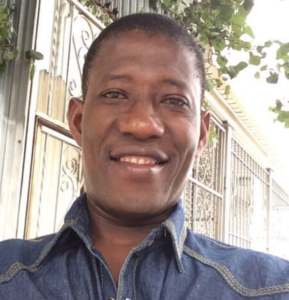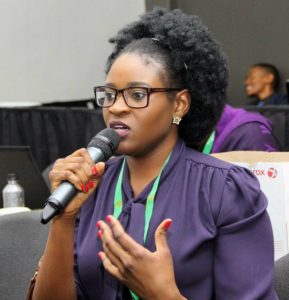Minds of the Movement
An ICNC blog on the people and power of civil resistance
by Amber FrenchFebruary 13, 2018
When thousands of Togolese marched in the streets of Lomé and other cities around the world last August, demanding election reforms, it was not the first time they had come together to pressure their government for democratic change.

Inoussa Moussa, an activist in the Togolese diaspora in Washington, DC. Source: Himself.
Inoussa Moussa, a pro-democracy activist and member of the Togolese diaspora in Washington, DC, says the struggle dates back to the late 1980s and early 1990s. Having seen nonviolent uprisings give way to democratic transitions in Eastern Europe, Inoussa and other Togolese students began a democracy movement that gained momentum until the regime brutally repressed it in late fall 1990.
Inoussa left Togo for the United States in the early 2000s after drawing too much unwanted attention from the government for his pro-democracy activism. Since then, he has become a prominent actor in the Togolese diaspora.
How does he spend his time? “Doing everything I can to inform the diaspora, to bring them to understand and become more interested in this patriotic struggle. My work is to try to raise awareness and mobilize the diaspora,” he says.
In one of his almost daily dispatches via WhatsApp to movement members and supporters around the world, he declares, “My very dear compatriots, combatants for freedom, victory to the people! Victory to the people. Reminder: New York is calling us, on the fourth of January 2018 at 10am. Let us go out! Let us brave the cold and the snow. The cold is not repression! The snow is not repression!”
According to Inoussa, the Gnassingbé regime, a family dynasty that has been in power since the late 1960s, is doing everything it can to steer the struggle toward violence—which is precisely why it’s so important for activists on the ground to remain nonviolent. To resist violence itself. This is apparently no easy task.

Farida Nabourema, an activist and journalist based in Lomé, Togo. Source: Farida Nabourema's Facebook page.
Farida Nabourema, a Lomé-based activist and journalist with strong ties in Washington, DC, as well, tells me she struggles to convince others of the strategic value of waging nonviolent conflict for democracy. Sometimes it’s like she’s “preaching in the desert,” she says.
When asked why the movement had not succeeded in achieving their goals yet, Farida replies, “We are failing because we want a quick fix.” This seems to be her assessment of why the movement has not achieved its full goals at the moment, but longer term, her prognosis is more positive, stating that: “We are winning this.” How can she be so sure? “Because hundreds of thousands of people are in the streets, and that’s already impressive.”
Inoussa is convinced too, because the regime has begun engaging in a dialogue with the opposition—an unexpected but perhaps promising shift for the movement. However, as Inoussa and Farida both note, the people are not going to stop nonviolently pressuring the regime.
Over time, Farida has honed her case for nonviolent struggle over violence.
“For many people, ‘nonviolence’ means impunity. They tell me, ‘Let’s hire mercenaries, from Nigeria or elsewhere. They will put things back in order in two weeks.’ They don’t realize that [nonviolent conflict] is a struggle technique itself... I make the strategic appeal, not the emotional appeal to people.”
Her views about the importance of nonviolent discipline concur with the results of a soon-to-be-published ICNC special report on mass killings and civil resistance. Based on data from several decades of uprisings, the study finds that nonviolent uprisings are almost three times less likely than violent rebellions to encounter mass killings.
Inoussa echoes this challenge. “We always have to ourselves: Only nonviolence. But there are some people who think we have to go with violence. We have to explain to them that it’s a dictatorial power. [Gnassingbé] has arms, he has everything. If we engage in violent struggle, there will be a blood bath.”
Follow Farida Nabourema on Twitter @Farida_N and on Facebook here for regular updates in French and English on the situation in Togo.
Further Reading in French and English:
Chenoweth, Erica and Maria J. Stephan. "How the world is proving Martin Luther King right about nonviolence." Washington Post, January 18, 2016. Download the article in English / Télécharger la version française.
Merriman, Hardy. "Agents of Change and Nonviolent Action." Conservation Biology, Volume 22, No. 2, April 2008. Download the article in English / Télécharger la version française.
Miller, Christopher A. Only Young Once: An Introduction to Nonviolent Struggle for Youths. University for Peace, Africa Programme, 2009. Download the article in English / Télécharger la version française.

Amber French
Amber French is Senior Editorial Advisor at ICNC, Managing Editor of the Minds of the Movement blog (est. June 2017) and Project Co-Lead of REACT (Research-in-Action) focusing on the power of activist writing. Currently based in Paris, France, she continues to develop thought leadership on civil resistance in French.
Read More